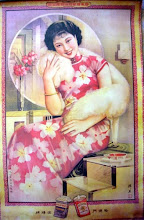i celebrated thanksgiving yesterday with a warm and wonderful collection of "beijing family". we were american, canadian, chinese, german, french, italian, australian. it was the first thanksgiving for some, a familiar tradition for others. after the meal, i encouraged everyone to go around the table and share what they were thankful for. that sharing seems to me to be the whole purpose of the holiday. (although i understand that some say overeating is the real agenda.) in any case, when it was my turn, after being thankful for my nephews, my family and friends and other blessings of the past year, i said i was thankful for the legal charade in this country has given me the opportunity to do such meaningful work. a bit cynical, perhaps, but i stumbled across the expression this week and it more accurately captures my work here than any other term.
i came across the "legal charade" concept in philip pan's excellent 'out of mao's shadow', which i have been meaning to read for some time but only just did so. it's very well arranged, thoughtful, and thought-provoking. in a chapter about one of the weiquan (rights protecting) lawyers there is this illuminating passage:
given the city's reputation for corruption, it seemed doubtful he had much of a chance of winning the case, and i asked him why he was even bothering. he laughed, and acknowledges that he didn't expect to win. "i still have to do a good job," he explained. "that's my obligation to my clients." but there was more to it than that. the party claimed to govern by the rule of law. it debated legislation, set up courts, hired judges, held trials - it wrapped itself in the trappings of the law, because doing so conferred an aura of legitimacy on it. it was a charade, of course. the party spent three times more on its riot control police than it did on courts and prosecutors, and when push came to shove, it believed it had the authority to do whatever it wanted, legal or not. pu understood this as well as anyone. but he believed the legal charade offered an opportunity. using the courtroom as a stage, he intended to present a convincing case to the public. if he did a good job, the party could still rule against him, but it would have to drop the charade, expose its commitment to the law as a fraud, and pay a price in damage to its image. the stronger the case he presented, pu believed, the higher that price would be, and if it were high enough, party leaders might think twice about putting themselves above the legal system. in that moment of hesitation, something remarkable could happen. the charade could become a reality and the party could be constrained by its own sham laws.
i recognized my own work, so humble in comparison to the courageous work of the weiquan lawyers, in this passage. we are also well aware of the charade and operate by ceaselessly finding spaces where that hesitation might allow justice to rush in.
i didn't mean to be insulting when i said i was thankful for the charade. the chinese people deserve so much better. but without the charade the situation would be much bleaker. at least the illusion of the rule of law provides hope that one day the party will be compelled to live up to its own laws. what progress has been made in recent years - what freedoms and rights the chinese people now enjoy - has come only because individuals have demanded and fought for it, and because the party has retreated in the face of such pressure. the hope is therefore essential to securing even greater freedom in china. and for that hope i am thankful.
i seem to be having a number of conversations about china's future lately. what else is there to talk about, really? ; ). i am always surprised at how easily outsiders are willing to overlook or throw a shiny gloss on the situation here. how there's a subtle cringe that certain people make when i call this country's government what it is: authoritarian. i understand china is seen as the land of incredible, limitless economic opportunity. (and the corporate authoritarian government wants you to see her that way.) but are the opportunities credible without rule of law? and is market access worth wearing blinders for? i sometimes wonder why it seems that the world coddles china and swallows the governments glossy images. she doesn't coddle us.
it is an interesting time to be back here. i am curious to see whether the charade will ever unravel and am intrigued to see how such events it will unfold. in the meanwhile, we beat on, borne back ceaselessly into the past.
Subscribe to:
Post Comments (Atom)

No comments:
Post a Comment